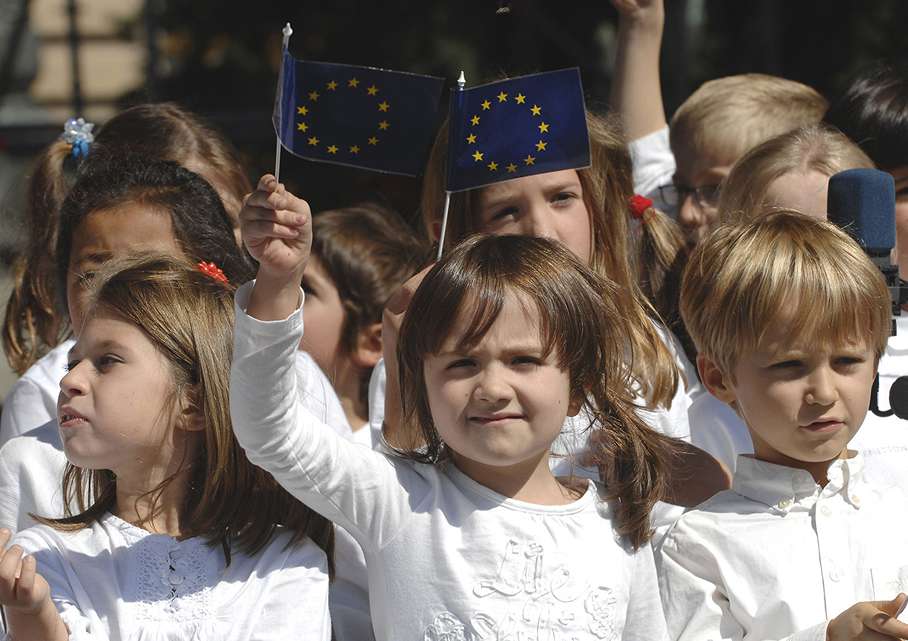Children

Violence in different forms and settings, lack of access to justice, challenges due to new technology, poverty, social exclusion and discrimination disproportionately affect children. The Council of Europe is committed to ensure the effective protection of children and to empower them in fulfilling their rights. It adopts a transversal approach around multi-annual strategies aimed at maximising states individual and collective capacity to make the rights of children a reality: the current strategy runs from 2022 to 2027.
Challenges are addressed through targeted actions. Member states are supported with guidelines and other tools to implement international and Council of Europe standards on children’s rights and to protect children from violence through co-operation activities. Partnerships with other international organisations and civil society are developed to ensure coherence, to make the most of synergies and to strengthen the impact of action taken.
Focus 2024-2027
The CDENF’s Terms of Reference for the period 2024-2027 set out in detail its tasks and responsibilities, with a focus on the following topics:
- Oversee the implementation of the Council of Europe Strategy for the Rights of the Child (2022-2027);
- Prevent and combat violence against children, including through the provision of guidance on age-appropriate comprehensive sexuality education;
- Ensure justice is adapted to children’s needs, by carrying out a thematic review of the Guidelines of the Committee of Ministers on Child-friendly justice and by developing guidance on multidisciplinary and interagency services for child-friendly justice;
- Protect the best interests of the child in parental separation and in care proceedings;
- Promote children’s participation;
- Protect children’s personal data and privacy;
- Analyse issues on children and artificial intelligence.
During this period, the CDENF also oversees the following subordinate bodies:
- The Committee of Experts on the rights and the best interests of the child in parental separation and in care proceedings (CJ/ENF-ISE), jointly with the European Committee on Legal Co-operation (CDCJ),
- The Committee of Experts on the prevention of violence (ENF-VAE), and
- The Committee of Experts on access to child-friendly justice through multidisciplinary and Interagency services (ENF-JUS).
Civil society involvement
The CDENF, as well as its subordinate bodies, includes representatives from civil society:
- Participant: Conference of INGOs (CINGO)
- Observers: several international and European NGOs
- Consultation with civil society, either through direct participation in meetings, dedicated hearings, in writing or through collaboration in child participation activities
Protection of children against sexual exploitation and sexual abuse (Lanzarote Convention)
The Council of Europe Convention on the Protection of Children against Sexual Exploitation and Sexual Abuse, also known as Lanzarote Convention, criminalises all forms of sexual offences against children. It requires States to adopt specific legislation and take measures to prevent sexual violence, to protect child victims and to prosecute perpetrators.
Civil society organisations (CSOs) are encouraged to actively participate in the monitoring and capacity building work of the Lanzarote Committee. The Committee invites CSOs to provide additional information to the questionnaires sent out during its monitoring rounds and by implementing child participation workshops to feed into the Committee’s monitoring work. National and local CSOs may also take part as speakers in the meetings and capacity building events of the Committee. International non-governmental organisations working in the field of prevention and protection of children from sexual abuse and sexual exploitation may be admitted as observers to the Lanzarote Committee.
For more information on how to contribute to the Lanzarote Committee’s work, please see the dedicated webpage.
18 November
Civil society has an essential role to play in raising awareness on the protection of children against sexual exploitation and sexual abuse on the occasion of our annual awareness raising day: 18 November. Many CSOs undertake activities to combat sexual violence against children in the context of this day. Their activities are promoted on a dedicated website – End Child Sex Abuse Day. This helps build stronger ties with the Council of Europe in general and the Children’s Rights Division in particular.
Consultation Group on the Children of Ukraine (CGU)
As a practical implementation of the Declaration on the situation of the children of Ukraine (Appendix II of the Reykjavík Declaration), a Council of Europe Consultation Group on the Children of Ukraine (CGU) was formally launched in November 2023.
The main objective of the CGU is to act as an operational platform to facilitate dialogue and the exchange of information, in a multilateral setting, on policies regarding Ukrainian children residing in Council of Europe member states.
41 Council of Europe member states (situation: October 2024) have appointed national experts responsible for decision making and co-ordination of issues related to children of Ukraine, mainly from Ministries of Social Affairs, but also from Ministries of Justice or Interior.
Other strategic partners, including the European Commission, the EU Asylum Agency (EUAA), the EU Fundamental Rights Agency (FRA), UNHCR, UNICEF ECARO, the Hague Conference on Private International Law (HCCH), and some key civil society organisations, have also nominated focal points, both Ukrainian and European umbrella organisations.
Co-operation projects
To support states in implementing children’s rights, the Council of Europe offers technical assistance that focuses on reviewing legislation and policies, on training and on awareness-raising. The co-operation activities are built on the standards and monitoring findings of the Organisation and flow from the priorities of the Council of Europe Strategy for the Rights of the Child. The Children’s Rights Division co-operates with civil society as part of these projects and grassroots NGOs are always invited to contribute on issues such as child-friendly justice, juvenile justice, child sexual exploitation and abuse – including online – and eliminating all forms of violence against children.



